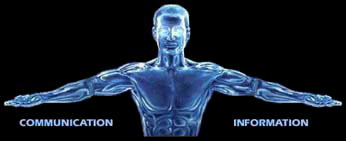Introduction
We encourage you to verify the source images for yourself, rather than just simply accept the facts that are presented here.
Exact details of the used image templates can be found here.
Some reports on this website are based on previous ones. So it is extremely important to read the reports in chronological order.
Details can turn up that were probably already been analyzed in detail. If you are new here and you directly start reading the
recent reports without prior knowledge, then it could happen, that the required context is not recognizable.
You do yourself and us a favor when you first start with the oldest reports.
This report contains references to structural anomalies in Aram Chaos and several mythological elements. We recommend that you
first review the previous reports that are relevant for this document, if you have not read them yet.
These include the following documents:
The Mystery of the Mars Symbol
The Mars symbol is one of the most fascinating, but also one of the most puzzling findings of our research. The similarities with the winged
solar disc in ancient Egypt or the Mesopotamian culture inevitably throw up questions. We know, that the winged sun disk
stands in connection with the worship of a sun god. But is this symbol therefore a purely cultic feature? Could this be a sign of a sun god
of extraterrestrial origin?
In Egyptian mythology, the winged sun disk is assigned to Behedeti. Behedeti is a variant of the ancient Egyptian deity
Horus. He appeared in several other forms and was therefore titled with different epithets, each one underlined different characteristic features.
So, Horus also appears as a falcon with a sun or as an upright standing man with a falcon head. His emblem in the form of solar wings
was often used as a symbol of a victorious nation, and brought Horus the rank of a god of war and a war-making leader.
Due to this fact, the king (Pharaoh) was regarded as the earthly incarnation of Horus. Because the kings
worshiped the sun god Re at the same time, it came to an identifikation of Horus with the sun.

In the Akkadian and Babylonian mythology Shamash (Šamaš) embodied the sun god. Shamash is depicted as a man within the solar wings.
Among the Sumerians this deity is known as Utu. On neo-Assyrian reliefs it is Ashur, who is depicted as an archer
with a horn crown within a winged sun. This iconographic representation has significantly influenced the icon image of Ahura Mazda.
The faith behind Ahura Mazda is the Zoroastrism. Monotheistic designed, the Zoroastrianism stands in contrast to other hitherto prevailing
beliefs in the Mesopotamian region, which had been always polytheistic. The first traces extend back to about 1800 BC.
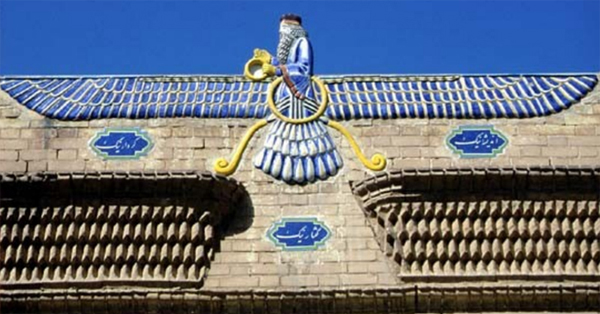
The Faravahar symbol above the entrance of the fire temple in Yazd, Iran
Zoroastrianism is based on three basic principles. Here these principles are depicted below the Faravahar symbol as labeled circles.
Within the circles the following text is written: speak well, think well, act well.
The Right View
What significance has the winged sun symbol of Mars? The individual segments can be associated with archetypical elements.
The ring with its cross pattern represents the radiant center - like a star respectively a sun-like symbol. This radiant center is located on
the tip of a pyramid structure. A pyramid could be related to the aspect of importance and with the rise to the the top of the pyramid.
The pairs of wings on the sides is associated with the element of flight, which in turn is in connection with the aspect of rising. But who or what
should rise?
According to the teachings of Zarathustra, the prophet of Zoroastrianism, the Faravahar icon symbolizes the spirit
respectively the soul. The soul is immortal and exists beyond death. Human life represents only a stage, that serves for
the purpose of personal growth. The goal is the rise of the spiritual consciousness in order to reach a higher metaphysical level.
These are elements that we would bring in connection with Buddhism. However, the Zoroastrianism is older. The basic idea of the
dualistic struggle between good and evil has been adopted by many other religions.
The idea that the symbol can also be viewed in three dimensions, was initially just a playful idea.
Since the pyramid structures reveales three sides in its depiction, the question arises how the whole pyramid may look like.
Conceivable is a pyramid with six sides. But also an eight-sided shape is possible. However, in case of an eight-sided pyramid, we would
be able to see the side faces. Actually we should see a total of five sides of the pyramid. We just can not see the three sides in the rear part.
The octagonal shape seems not to be working. But then we noticed that the wing elements could represent the missing sides. Because two wings combined
are needed to precisely fill the area that
would be necessary to create a side. That would be an ingenious trick. Thus it has been made possible to depict the symbol with the
present wing elements without adding more elements. The wings are part of the pyramid. It makes use of already existing material.
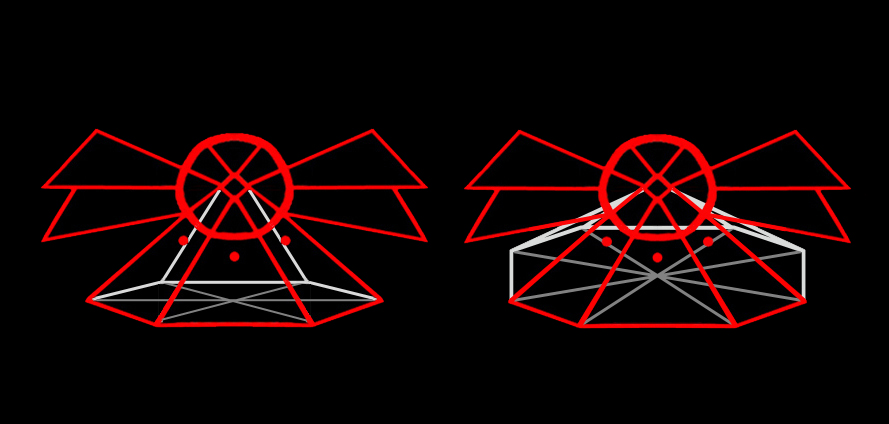
Possible pyramid shapes on the basis of a hexagon and an octagon
Another ingenious detail is the ring with its "cross rays". In addition to its symbolic and psychological significance, this part has also a
geometric meaning. Because the ring shows in its interior the tip of an octagonal pyramid from above. For both perspectives, the ring takes a
logical function. If we rotate the drawing by 90 ° in the Z-axis to the front, we obtain a view from the top on the octagonal pyramid.
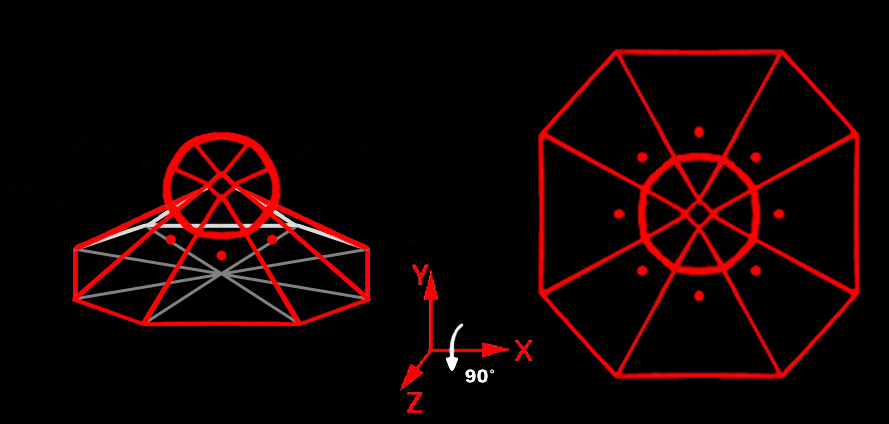
Rotation of the Mars symbol by 90° in the Z-axis to the front
If we assume that all sides are equal, then the dot pattern can be found on the other faces, too. However, what kind of information
will be revealed by this detail? It is a very striking coincidence that the cross rays fit unchanged in this new geometric shape, but
perhaps here lies a deeper meaning. What does it mean that we can now see, from a bird's-eye view, eight points instead of three in the
front view?
The Mars symbol is a stylized form of the winged sun disk. The main symbol for the Zoroastrian faith is also the
winged sun disk, repectively the so-called Faravahar icon. The new representation of the Mars symbol may look entirely
different, but also this form can be assigned to a specific religion. The wheel with the eight segments represent
the symbol for Buddhism (the Dharmachakra
 ),
actually for the teaching of Buddha. The eight spokes of the wheel point
to the so-called "noble eightfolded path". ),
actually for the teaching of Buddha. The eight spokes of the wheel point
to the so-called "noble eightfolded path".
A Direct Comparison
In spite of its abstract structure, the new Mars symbol shows some very distinctive details. Perhaps there is an earthly counterpart
like this symbol, which has more in common than just the eight spokes. Here, the image-search function of various search engines
are a helpful tool to get a general overviw about various depictions of Dharmachakras. At first glance, Dharmachakras seem to all
look the same, but it's the small details that could be decisive.
The relationship to the element of the sun or sun gods was already a repeating pattern when we look to the winged sun disk
In the Hindu pantheon, too, there is a solar deity, in whose honor
Temples were build. In the Indian state of Orissa there is the Sun Temple of Konark thar was established in honor of
the deity Surya. Like in the Greek mythology there is a sky car, which is driven by a solar deity.
It is this process that ensures a day/night cycle.
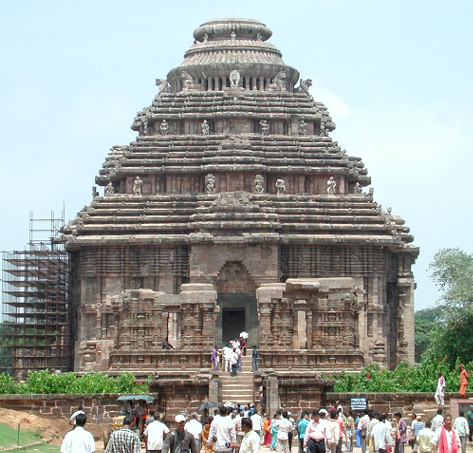
The Sun Temple of Kornak in India
The sides of the Sun Temple has a total of 24 large spoke wheels. They are part of the sky car.
Even in Hinduism the eight-spoked wheel plays an important role. Thus, from Hindu perspective the chakra is meant to be a gift
from the god Brahma to Buddha when he attained enlightenment. As like the symbol of the winged sun disk, it can not be
exactly clarified where the wheel actually came from.
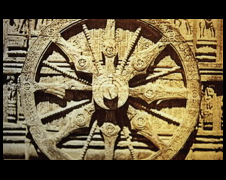
One of the Dharma wheels at the Sun Temple in Konark, India
Looking at these spoke wheels in detail, they show some very distinct characteristics.
For example, the spokes have thickenings with circular markings. In addition to the eight large spokes there are eight thin
spokes in between, which in turn stimulate the association with the known radiation cross.
At this point, a direct comparison between the temple wheel with the "Mars Wheel" makes sense. The semi-transparent overlay
in the next image shows the similarities between both wheels.
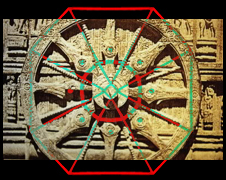
Image overlay of the "Mars Wheel" on a Dharma wheel
Does this match again represent just an extraordinary coincidence? Due to its distinctive shape, the Mars Wheel could
explain why many depictions of the Dharmachakras also have rounded thickenings
within the spokes. According to the 'evolution of the symbolism' in other versions of the wheel,
the thickenings move to the outer edge of the wheel or they simply disappear completely.
The two versions of the Mars symbol can now be assigned to two important religions.
Zoroastrianism may have only a small share, measured by the number of followers of this religion,
but on the other hand it influenced and enriched all other religions such as the Judaism, Christianity, Islam, Hinuism and Buddhism.
It is getting interesting, when we juxtapose the fundamental principles of these two religions.
This shows that the three basic principles of Zoroastrianism are also components of the Buddhist eightfolded path.
 |
 |
| Zoroastrism |
Buddhism |
| Three basic principles |
Noble Eightfold Path |
| |
Right View |
| Good Thoughts |
Right Thoughts |
| Good Words |
Right Speech |
| Good Deeds |
Right Behavior/Action |
| |
Right Livelihood |
| |
Right Effort |
| |
Right Mindfulness |
| |
Right Concentration |
Depending on the viewing angle we see in the front view the winged sun disc with the three points.
From a bird's eye view the icon changes into the Dharmachakra, the wheel of law, which has eight points. Depending on the perspective
new details appear, but others disappear again. A suggestion, which view is the better one, is not possible.
To capture the entire image, both views are needed.
The Religion of the Extraterrestrials?
More and more evidences suggest that the Mars symbol has to be interpreted as a religious significance. But what other
conclusions can be drawn from this fact? Are religions just a fallacy? Staged and injected into our culture by extraterrestrial beings?
If the Mars symbol is a religious sign, then it would be obvious that the seven-headed serpent monument is connected with religious aspects.
Represents the mound, on which the snake monument was discovered, a place of worship?
A temple or some kind of church? Without the ability to take a look into it, it will be difficult to find clear answers here.
But there are hints... here on Earth.
During the research on myths about multiheaded dragon creatures, in addition to the written records
also pictorial representations have been checked for usable information. By doing this, images came to light that
show remarkable similarities with details which were discovered on Mars in Aram Chaos.
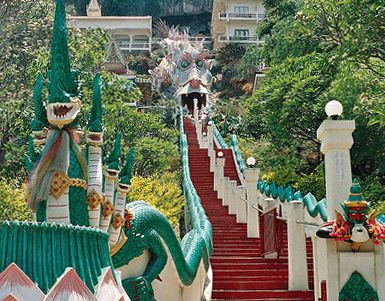
The cave temple "Wat Ban Tham" in Thailand
The image shows the staircase to the so-called Golden Dragon Cave Temple "Wat Ban Tham", that is located in the western central region of Thailand close
to Kanchanaburi. The sides of the staircase are decorated with a seven-headed snake, whose body extends the entire way up the cave entrance - a huge dragon mouth!
In Thailand, there are predominantly Buddhist temple in the tradition of the Theravada. Buddhist cave temples are an
underground variant of a Buddhist monastery and temple complex, which can be traced back to early Buddhistic traditions.
As a young wandering ascetic the historical Siddhartha Gautama (the future Buddha) drew back into caves for meditation,
and also as a Buddha, he used caves as a place of meditation. The seven-headed serpent in this context is Mucalinda
 .
Here we can find again the ubiquitous eight-spoked wheel. .
Here we can find again the ubiquitous eight-spoked wheel.
Beside the Asian development lines the cave temples and other (sometimes much older) rock constructions occur in other
ancient civilizations such as in Egypt, Assyria, the Hittite Empire, Lycia and the Nabataeans.
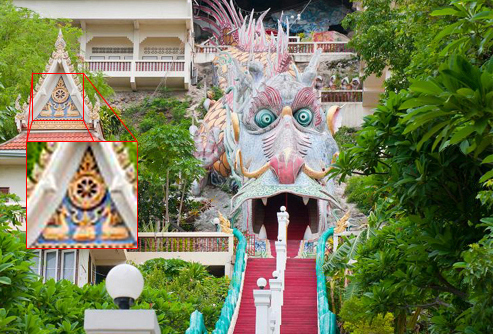
The eight-spoked wheel next to the dragon mouth entrance
That what was originally here at this place, before the houses and the staircase and the decoration were built, was just the cave.
More than a hundred years ago, Buddhist monks declared this cave as a cave temple in honor of Buddha.
One sees quite clearly that the snakes and the dragon head are from a more recent day. When exactly these structures were build
can not be accurately determined. Since these structures can not be found on satellite images, they must be still relatively new.
The cave temple "Wat Ban Tham" may be far from being an ancient sacred building, but was set up on old Buddhistic traditions.
The embellishments with seven-headed snakes are one element of it. That the cave entrance is accessible via a
dragon mouth, also bases on old ideas. This type of dragon head entrances can be mainly found in the East Asian region.
The magnificent colored dragon mouth designs that can be found on nowadays temple entrances, do not necessarily raise the
impression of an old tradition. They now serve primarily as an eye catcher to attract as many visitors as possible. The large colored
dragon mouth entrances that lead into these temples, are apparently from a more recent date. Compared to the dragon mouth entrance on Mars,
the earthly representatives are quite modest.

To enlarge click on one of the images
The eight-spoke wheel, the seven-headed serpent and a dragon-mouth entrance, leading into a cave embedded in a rock mound -
All those are components that can also be found on Mars in Aram Chaos. The similarities with the Buddhist temple caves are
so amazing that they allow the assumption that the Ladon cave may be a sacred cave.
On the outside the multi-headed snake monument has been built, while inside large cavities were created.
In Buddhist temple caves usually a Buddha shrine is preserved in such cavities. Tremendously insightful now would be a look inside the cave in
Aram Chaos. One could not expect to find there a Buddha shrine too, but maybe something similar, such as a statue.
These all are very strong evidences that for those extraterrestrial civilization the religion played a very important role
and the construction of cultic plants is as important as the construction of technically-oriented facilities for the purpose of life support.
The numerous parallels that came up by comparing the structures and symbols of Mars with those of our human history,
show that there was a cultural impact from the outside. Over the millennia, however, a change has taken place. Initially, from the
various civilizations primarily myths were known about a variety of gods that were often characterized by their very martial behavior.
For every aspect of life there was a deity who was personified to certain forces of nature.
According to personal preferences or beliefs, the people could worship certain gods.
At a certain point in the subsequent cultural eras a gradually monotheistic view has developed that
had their beginnings, among others, in the Zoroastrianism or the monolatry, that Pharaoh Akhenaten tried to enforce, by declaring
the ancient Egyptian God Aten as the supreme deity in the position of a sun god and in which all the other deities just play a minor role.
In the teaching tradition of the Buddhism the focus on God is further resolved by a kind of universal truth.
and Buddha is just a guide to this truth.
Further Matches
A closer examination reveals parallels between the different cultures and religions. Here one can either recognize comprehensible pattern
or they are attributed to chance
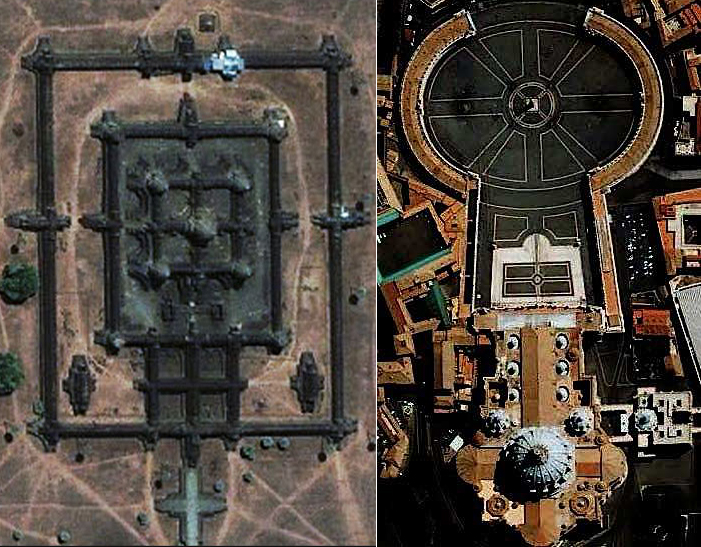
Angkor Wat and the Vatican from a bird's eye view. The same basic idea?
The eight spoke wheel is not only in Hindu-Buddhist believe a recurring Symbol.
Similarities that can be found between the different cultures go beyond a collective-archetypal shaping.
The limits of probability have to be constantly redefined and pushed back, the more examples can be found
and you still want to assume that these are just coincidences. The examples shown here are only a very small part of the tip
of the iceberg. Actually during our research work we have collected many examples in relatively short time.
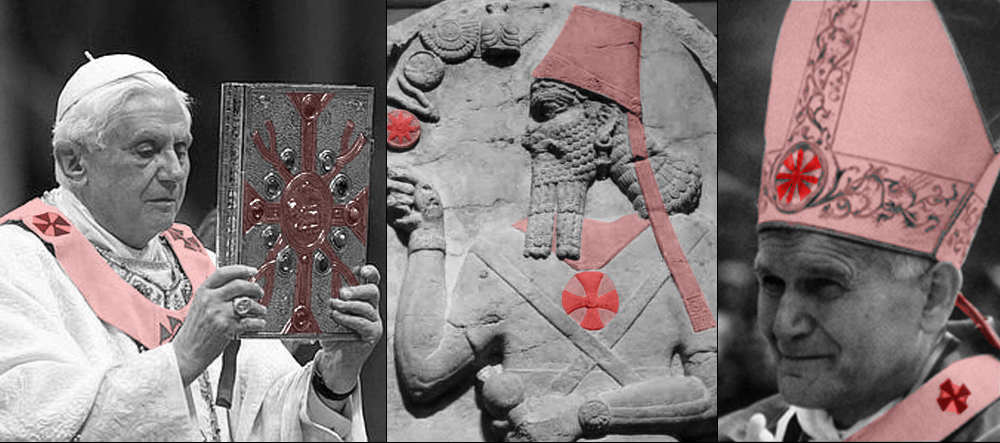
Babylon-Vatican parallels?
It is important to clarify the origin of these symbols and to critically question their current significance. But the main question is,
whether this prejudice is possible, because religion is a very sensitive issue. Deep-rooted traditions, social constraints and
stories that have been mediated to us since our earliest childhood do not make it easy to doubt this, and to replace it by a construct
that is based on extra-terrestrial influence.
|
